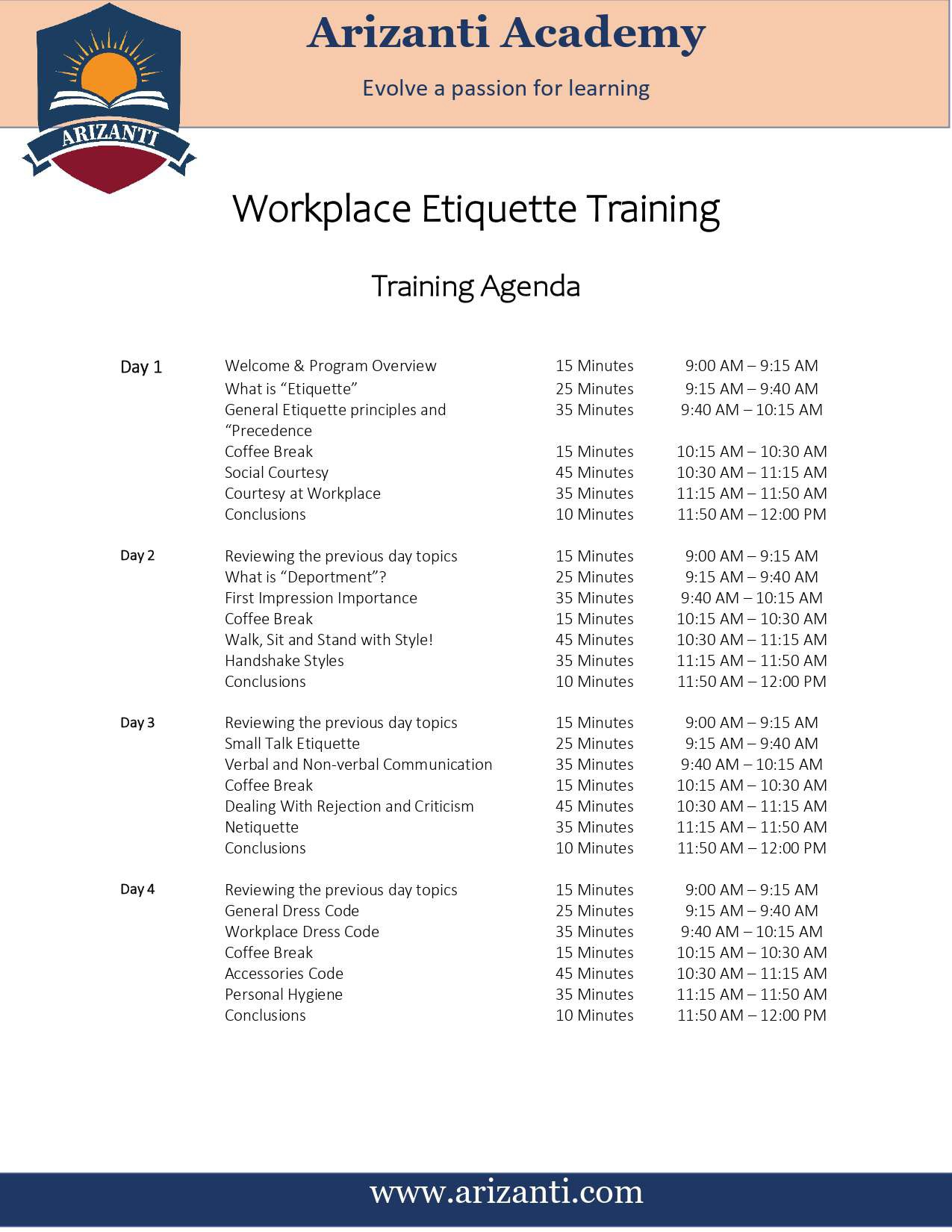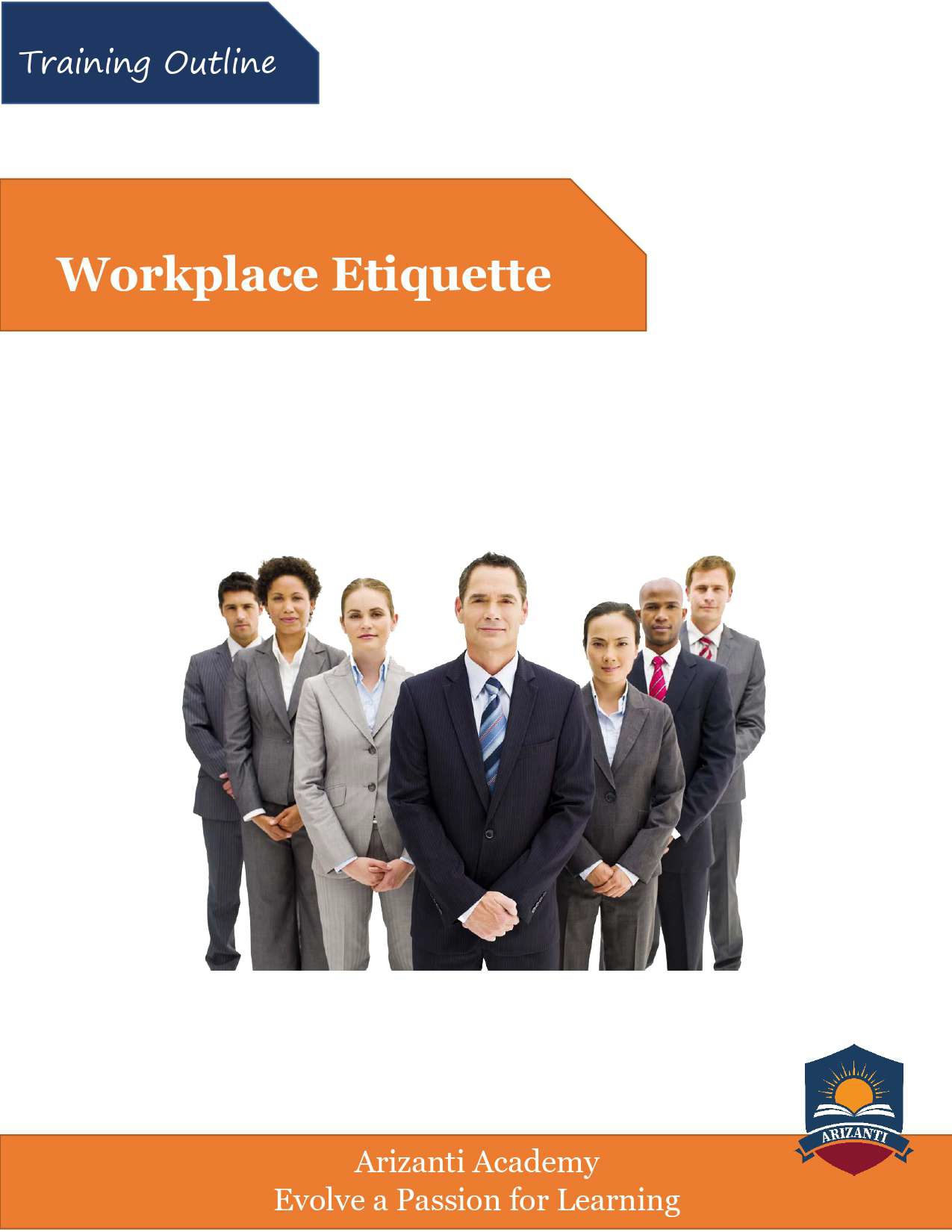By the end of this training, we expect the participants to have a deeper knowledge and understanding of Workplace Etiquettes by:
- Providing participants with full knowledge of the concepts and fundamental basics used in work and social etiquette.
- Providing participants with the necessary skills in the field of professional and social etiquette and developing their skills, to apply these skills in their social and professional lives to face the various circumstances with others.
- Simplify the concepts of work etiquette and explore their relationship with daily individual behaviors.
- Defining workplace etiquette and stress the importance of creating a work environment conducive to positive interaction among employees.
- Identifying behaviors considered important for maintaining workplace etiquette.
- Expanding knowledge and skills development among participants in the practice and application of social etiquette in the field of work.
- Create a good impression and avoid misbehavior or embarrassing practices in important situations and interact respectfully with people from different cultures, whether they are co-workers, bosses or subordinates, customers or clients.
Training Components:
The purpose of this session is to introduce a general idea of the meaning of etiquette, its origins and branches, the principles of good morals and behavior with others under the etiquette concept, thus developing the participants’ skills in how to communicate and deal with superiors and subordinates in the work environment in accordance with the standards and ethics of workplace etiquette.
At the end of this day, participants will be able to:- Knowing the origins of etiquette, history and development, and its basic components.
- Knowing the origins of social and professional courtesies.
- Knowledge of general etiquette principles and behaving with others according to age and position under the concept of precedence.
- Knowing the basics of social courtesies and their role in professional and social life.
This part of the program aims to provide a general idea of essential part of etiquette; (Deportment), which is mainly concerned with how to lift and carry the body correctly; body language in other words. Participants will learn the basics of body language and its relationship with self-confidence. Participants will learn also about the importance of the first impression and its great impact on others.
At the end of this day, participants will be able to:- Learn the importance of body language and its relationship with self-confidence.
- How to create a good first impression on others to create a positive self-image and avoid misconducts or embarrassing practices in important situations.
- Knowing how to walk, sit, and stand in a correct manner. How to use hands to serve effective communication.
- Learn the appropriate handshake and greeting etiquette for various social and professional occasions.
This part of the program aims to provide a comprehensive understanding on the role of active communication on our impact on others. The principles of constructive dialogue and discussion will be discussed thoroughly along with the techniques of initiating conversations with strangers at social events or in the work environment, and how to use voice tone techniques to convey positive messages to others. The participants will also learn about the most important techniques for dealing with challenging circumstances during the communication process. This part will also tackle the terms and rules of using modern communication technologies in the work environment; “Netiquette”.
At the end of this day the trainees will be able to:- Knowing the etiquette of conversation, the power of the word's impact on others, and the principles of constructive dialogue.
- How to start a conversation with strangers and small talk etiquette.
- Knowing the power of effective listening etiquette.
- Knowing the importance verbal and non-verbal communication techniques in delivering influential messages to others in an effective manner.
- Knowing the etiquette of rejection and acceptance, dealing with criticism, and how to deal with questions and embarrassing situations.
- Knowing the terms and rules of “Netiquette”; Manners in The Online World.
This part of the training will deal with the etiquette our external appearance and the fundamental elements that must be taken into account in order to present the best image of ourselves and thus create a positive and influential image that would positively impact others. General rules of dress etiquette will be discussed along with the most important issues to avoid when choosing the appropriate types of our clothes in the work environment and social occasions. The issue of personal hygiene and its decisive impact on our communication with others will also be discussed carefully.
At the end of this day the trainees will be able to:- Know the general rules of dress and appearance etiquette.
- Determine the style of formal and informal clothing according to occasions and daytimes.
- Knowing the acceptable and prohibited appearance conditions in the workplace.
- Learn the terms and rules for using accessories for men and women in workplace and social events.
- Knowing terms and rules of personal hygiene and its impact on our communication with others.
Who should attend?
Anyone who aspires to become a professional in their workplace and build their comprehensive personal skill within their company and within the community. People who are looking up for the next level.
A: Private training courses can be delivered in its location in (Villa No. R3/169, New Azadi-Atconz, Erbil/KRI) or outside venue booked by Arizant Academy when there would be a need, or at your business premises.
Q: In which language the trainings are delivered?A: Our programs can be delivered in Kurdish, Arabic or English.
Q: What are your ideal training schedules?A: Half-day session: (09:00 am to 12:00 pm) or (2:00 pm to 5:00 pm) or to suit. Full-day session: (09:30 am to 15:30 pm) or to suit.
Our trainers are not only the most qualified professionally, but they are also the most capable of delivering information to the trainees. We rely on their selection, in addition to their high scientific specializations, on their experiences and personal abilities in implementing training programs of high value and positive returns, so that the training process does not become a mere waste of time and effort, but rather a real development of capabilities, skills and practical benefit acquired by our clients and their staff and practiced virtually to improve their overall performance.
In Arizanti Academy, we believe that accurate evaluation of training programs, based on scientific foundations and well-thought-out criteria, is the best way to achieve the desired goals of training, achieve maximum benefit from the program, and provide trainees with scientific knowledge, experience and practical skills. Therefore, we have built our evaluation systems based on accreditation and compatibility with a set of evaluation systems and international standards, where we rely in our work on: -
- Evaluation of the training program on the morning of the second day (if the program lasts for more than one day) to avoid any shortcomings in the program, and to achieve the objectives of the participants as groups and individuals.
- Participants' evaluation of the training material, the trainer, the place of training, training services and coordination on the last day of the program (this report is analyzed and the results are sent with the original evaluation sheets to the client with the final report).



